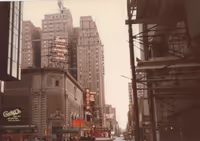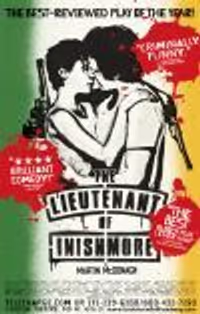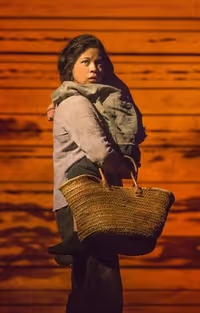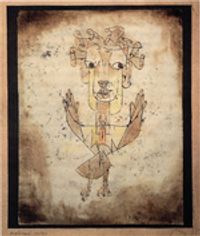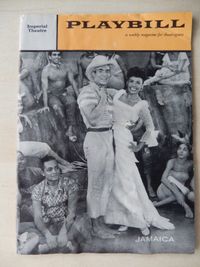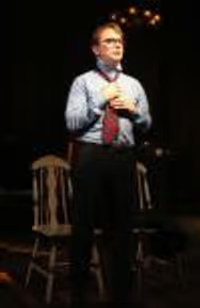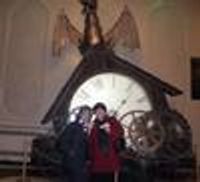The ending of "The Humans" (MAJOR SPOILERS)
#1The ending of "The Humans" (MAJOR SPOILERS)
Posted: 10/10/15 at 11:57pm
Hey guys!
I just saw this great show tonight and would like to discuss what the f*#k happened in those last few moments. (I know there is a thread for this show, but I wouldn't like to post a major spoiler in a thread for people deciding whether or not to see a show.)
So... what happened?
My guest and I, over dinner, came to the conclusion that Erik (played wonderfully by Mr. Birney) ultimately died. Throughout the play he is stumbling and even clutches his head in obvious pain at one point. He isn't sleeping according to their mother and had just sold their house earlier than expected (medical costs). Also, his daughter calls out to him to come upstairs, but she never sees him. And he doesn't respond. We think that he ultimately "followed the tunnel" and died.
I know some people posted that they weren't sure what to think of those last few moments, so I'd like to hear what others think. Any more thoughts?
I enjoyed this show very much and loved the performances (with a special shout out to the director as well as Cassie Beck!)
#2The ending of
Posted: 10/11/15 at 12:01am
My memory of it is foggy, but I don't think he dies at all. He basically confesses his sin, and I think he's just tormented with it and how he's basically ****ed up his life. And now he's trying to right his wrongs.
#3The ending of
Posted: 10/11/15 at 12:03am
Quite possibly.
I do have to admit, the whole "supernatural" side of this show came upon the audience very quickly. The shadow with the phone and then the Asian lady passing by...
It all was so strange, but very interesting. It reminded me of Annie Baker's "John".
Updated On: 10/11/15 at 12:03 AM#4The ending of
Posted: 10/11/15 at 1:03am
I thought the ending sequence of this play was very out of sync with the rest of the work.
#5The ending of
Posted: 10/11/15 at 1:06am
Kad said: "I thought the ending sequence of this play was very out of sync with the rest of the work."
I agree. It wasn't bad, but I'm not sure it was warranted. Would you mind sharing your interpretation?
#6The ending of
Posted: 10/11/15 at 10:45am
That's the thing- I don't feel the work gave me enough material to build a reasonable interpretation other than "some weird things happened, possibly as a manifestation of his guilt or possibly because the apartment building is terrible." I don't think he died, because there were no indications he had a life-threatening condition.
#7The ending of
Posted: 2/16/16 at 10:28am
We saw this on Saturday and the first thing I did when we got to the hotel room was to google "The Humans" and "Ending" and found this thread.
We were sitting in Row L, all the way on the left end of the row, so had limited view of the left side of the stage (couldn't see the windows or most of the staircase). We could see what seemed to be an Asian woman with a grocery cart go by the doorway at the end, but hard to be sure.
We thought is was odd that all show long, folks upstairs couldn't be heard by folks downstairs, but at the end, Eric and Bridget were talking from different floors without any difficulty.
We loved the show until those last few minutes. Ending dropped it from an A to a B.
neonlightsxo
Broadway Legend Joined: 7/29/08
#8The ending of
Posted: 2/16/16 at 10:30am
"We thought is was odd that all show long, folks upstairs couldn't be heard by folks downstairs"
That's not true. People could hear each other the whole time.
#9The ending of
Posted: 2/16/16 at 10:32am
No, most of the time the only eavesdropping was when characters were on the stairs or same level
Conversations were often held about people on the other floor who had no idea of the discussions.
#10The ending of
Posted: 2/16/16 at 10:44am
I sat all the way house left so missed the whole basement hallway view, was there a physical lady passing by? Was she a different actress? Confused if you guys are describing her as an Asian lady because the story calls for it or because you physically saw her face.
I also loved the performances but the play itself was not very compelling, as many have described in the other thread. It uses a lot of tropes and story lines but does not finish a single one. The ending, I personally think, showed that the playwright had no idea how to end it...
nasty_khakis
Broadway Legend Joined: 3/15/07
#11The ending of
Posted: 2/16/16 at 10:47am
She's implied to be Asian since they're in Chinatown, her hair, the way she's dressed, etc. I don't believe you ever see her face and I assume she's one of the female understudies.
CenterOrchestra
Swing Joined: 1/21/11
#12The ending of
Posted: 2/16/16 at 11:41am
My take was that he was "going through the tunnel" that he saw in his dream the night before - that Richard (brigid's boyfriend) told him to go through the next time.
10086sunset
Broadway Legend Joined: 2/8/16
#13The ending of
Posted: 2/16/16 at 11:11pm
Kad said: "I thought the ending sequence of this play was very out of sync with the rest of the work.
After seeing the play tonight, I couldn't agree more with this statement.
mamaleh
Broadway Legend Joined: 5/11/04
#14The ending of
Posted: 2/17/16 at 12:16pm
What about the door at the very end? Are we to read something into its movement? Or is it just that it's an old building?
(I saw this only at the Pels; does the current version end with that door...?)
#15The ending of
Posted: 2/17/16 at 4:40pm
Yes. The door slowly closes as if by itself at the end.
And all those pots and pans falling all by themselves earlier. If there's supposed to be a ghost or spirit here it isn't set up at all.
ChiTheaterFan
Broadway Legend Joined: 6/9/15
#16The ending of
Posted: 4/20/16 at 10:58pm
Since this whole thread is about the ending, I'm assuming there's no need to use the spoiler box so don't read on if you don't want spoilers.
Glad I searched and found this thread to realize I'm not the only one who didn't understand the ending at all.
I was actually very much enjoying the play until it tried to be about something. I thought the performances were great, and I saw some of my family members in each one of the characters. The relationship between the girls and their parents felt so real.
For me the negative turn was when they introduced the affair. It felt as though the playwright was thinking "I don't know how to end a play that's just dialogue and no story, so I have to make it about something." I had read there were supernatural elements to it but I was left unsure that's even what it was because they were so minimal. It was just bizarre.
I also thought the 911 backstory seemed gratuitous somehow. Maybe if they had done just one of these things--the 911 backstory OR the supernatural OR the family coming to grips with the affair... As it was I felt kind of like these things were all thrown at the wall to see what stuck.
I am glad I saw this as the performances were excellent. I really did like the play and think the dialogue was great, but I think I would've enjoyed it more if they hadn't tried to make it about so many things that I'm not sure what it was about.
I think those of you who enjoyed the aspects of this play that were about the characters and family relationships will really enjoy Mary Page Marlowe if/when it (hopefully) comes to New York from steppenwolf, which I have to think it will based on the raves. My complaint when I saw that was the ending was abrupt, but after seeing the humans I have come to appreciate it. They aren't that similar, but both have in common that they're not about any particularly novel story but just a family and people's relationships.
#17The ending of
Posted: 4/21/16 at 12:16am
No. He doesn't die. The whole point is with the elderly lady doing laundry. All the things that go bump in the night are not half as scary as facing tomorrow. Real life has skeletons in closets and ghosts of memory. The supernatural elements exist only as a counterpoint to reality. Take away that and you get a great play, not a masterpiece.
#18The ending of
Posted: 5/23/16 at 1:31pm
Two opinions. (Saw it last week)
1) I think the noises and building actions were actual. A bit metaphorical and creepy (and certainly dramiatic), but actual mechanical breakdowns and a door that worked itself free.
2) I thought he left to compact himself. His deep sobs before indicated a man who saw himself at the end of the road.
#19The ending of
Posted: 5/23/16 at 2:18pm
I was very unsettled by the ending, but maybe that was the whole point. All the stuff that happens to us in life - is it self-inflicted, or perpetrated by forces beyond our control?
SueBee06
Stand-by Joined: 1/12/16
#20The ending of
Posted: 5/23/16 at 2:31pm
As someone who hates scary movies, the last part of the play nearly ruined the whole thing for me. Instead of being immersed in what was happening, I was stressed the whole time waiting for something to jump out at me. And that also meant that I wasn't really focused on what was happening - I just wanted it to be over. Yes, I know I'm a wimp.
I liked but didn't love the rest of the play itself. Fantastic acting all around, though, and that made the evening so much more than it would have been in lesser actors' hands. I'm glad I saw it, but it's not something I'm telling friends they absolutely have to see.
#21The ending of
Posted: 5/23/16 at 4:17pm
It's been awhile since I saw it but I'm with those who saw it as a man who realized he effed up and now his daughters won't look at him the same way. The play hinted at moments where you realize that there's probably more between the parents than financial strain and caring for an elderly parent but looking back the girls would tease and make fun of their mother and were pretty precious with the father so when you find out about the father's betrayal it's huge. The lights going out and the quirks of apt living in Manhattan is what it is- including the old lady by the door who we heard about during the course of the show.
#22The ending of
Posted: 5/23/16 at 4:32pm
MarkBearSF said: "
2) I thought he left to compact himself. His deep sobs before indicated a man who saw himself at the end of the road."
Oh wow, that is DARK. Not a possibility that had occurred to me.
Tammy Goldring
Swing Joined: 10/20/16
#23The ending of Humans
Posted: 10/20/16 at 7:55pm
I agree that the Dad dies.The play has this mystical, esoteric feel to it throughout the play. It starts off with Mr. Birney standing on the top of the stairs and waiting in the darkness while a very loud booming noise can be heard foreshadowing the supernatural in the play.
We overhear Momo saying "You can't come back here! You can't come back from here!" It's as if she feels that he's going to die and she is behaving very upset by this notion.
The last scene he is seen crying and very emotional knowing that he is going to die and then walks into the tunnel of death as the door slowly closes behind him.
#24The ending of Humans
Posted: 11/12/16 at 9:52am
I saw this last night. I found the play riveting and the family dynamics very real, but left with so many questions because of where I was sitting. My lottery win ticket was Row C, house far left. I couldn't see anything that happened stage right (the window) or much of anything that happened upstage center first or second level. That means I couldn't see what Erik was seeing through the open door. It was very frustrating! After reading this thread I see why some might think Erik dies at the end. He was clearly struggling, physically and emotionally, throughout. Combine that with the dream elements and the increasing darkness, and it does seem to point that way.
Impossible2
Broadway Legend Joined: 3/31/18
#25The ending of Humans
Posted: 6/14/18 at 10:20am
Never realised this was such a sticking point for others, so this was my interpretation.
The whole play was about trauma and the different effects it has on different people.
Now it was obviously 2 years since I saw it so I am a bit sketchy on details but from memory the daughter had an injury from being in the tower when the plane hit. She also was left with IBS and an impaired ability to have a successful relationship. That was all the result of her trauma.
The Father had had an affair and whatever else had happened I can't remember and that was the result of his trauma. Then there were the effects of the trauma from the affair on his wife and other family members etc
When the noise happens at the end he is triggered back to the sound of the plane hitting the tower and the fear his daughter is inside. He immediately collapses in fear that the building is going to collapse around him.
The woman walking past is just a woman who lives in the building walking past the door. The atmosphere is meant to trigger the audience into feeling the same sense of unease and anxiety that the character is feeling at that point in time as he is having his flashback.
The slamming door is meant to scare the audience so they experience what he had just experienced so they get a better understanding of what it was like for him when his PTSD kicked in.
Videos


